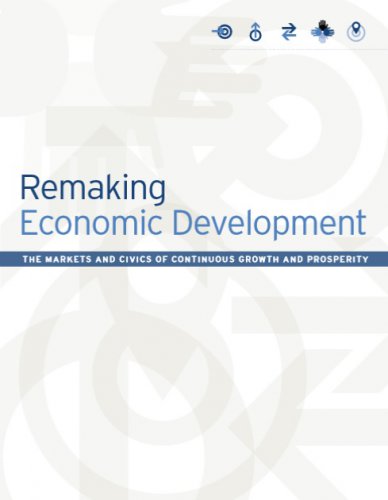“It’s time to shift and broaden the purpose and practice of economic development to generate continuous growth, prosperity, and inclusion.”
The lackluster U.S. economy is delivering a humbling lesson about economic development: Top-line growth doesn’t ensure bottom-line prosperity. The potential of economic development is to do what markets alone cannot do: influence growth through action and investments.
Leaders in cities and metro areas have an opportunity to remake economic development—to adopt a broader vision of economic development that can deliver continuous growth, prosperity, and inclusion in cities and metro areas. While some creative and committed leaders and organizations are embracing this version of economic development, it needs to be further scaled up.
Download Remaking Economic Development
This requires understanding the purpose of economic development and getting both the markets and civics right:
The goal: To put a regional economy on a trajectory of higher growth (growth) that increases the productivity of firms and workers (prosperity) and raises standards of living for all (inclusion), thus achieving deep prosperity—growth that is robust, shared, and enduring.
The markets: Industry clusters form the foundation of regional economies. Different industries concentrate in certain metro areas to access specialized local assets—innovation and entrepreneurship, other firms in traded sectors, skilled labor, infrastructure, and governance—that enable them to be productive and generate income from the sale of their products and services. Economic development should prioritize building strong business ecosystems for core industries, improving the productivity of firms and people, and facilitating trade—the market foundations from which growth, prosperity, and inclusion emerge.
The civics: To get the markets right requires good civics: the work to organize and implement strategies and initiatives that engage stakeholders and partners to achieve long-term goals. A data-driven economic narrative and sense of urgency, networked leadership with high capacity organizations for implementation, and engagement of diverse stakeholders and perspectives to ensure strategies are inclusive are all essential.
Table of Contents
Remaking economic development
The idea in brief
The idea in practice: Five action principles
Introduction
Why remake economic development?
The basics of economic development
Getting the markets right
Clusters and regional ecosystems
Productivity
Trade
Getting the civics right
Urgent and visible
Networked with high capacity institutions
Transparent and inclusive
Where the status quo falls short
The actions: Five principles
Set the right goals
Grow from within
Boost trade
Invest in people and skills
Connect place
Conclusion
Endnotes





